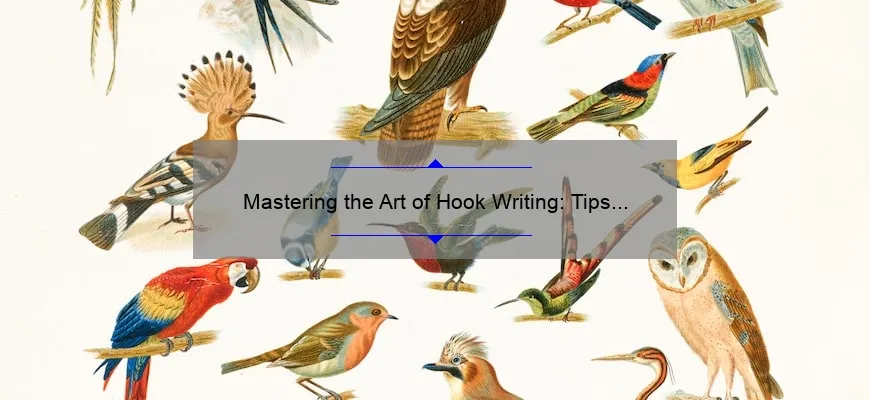Short answer how to write a hook: A hook is an engaging opening sentence or paragraph that captures the reader’s attention. To write one, identify the main theme of your writing and brainstorm ways to introduce it in a compelling way. Use vivid language, pose intriguing questions, or provide surprising statistics to draw readers in from the start.
Frequently Asked Questions About How To Write A Hook
If you’re a writer, then you know that starting your story or article with an engaging hook is essential to captivating your readers. But what exactly is a hook?
A hook is the first sentence or two of your writing piece that catches your reader’s attention and entices them to keep reading. Think of it as bait – you want to lure in your readers with something intriguing so that they won’t be able to resist continuing.
Here are some frequently asked questions about how to write a great hook:
What makes a good hook?
A good hook should grab the reader’s attention and provide enough intrigue for them to continue reading. It can be funny, dramatic, mysterious or shocking – whatever fits the tone and subject matter of your writing.
How do I come up with a catchy idea for my hook?
One way is by asking yourself what would make YOU interested in reading this particular piece? Put yourself in the shoes of someone who has no prior knowledge of the topic you’re writing about; what kind of information would pique their interest?
Another useful technique involves generating several potential hooks and choosing which one works best afterwards. Brainstorming multiple ideas gives plenty material options while helping writers focus on refining their thinking over time without settling too soon!
Can I use quotes as a hook?
Absolutely! Using famous quotes from historical figures, celebrities or philosophers often creates curiosity because people typically love insights into wise things not everyone has heard before.
Should I avoid using cliches when crafting my opening line?
Yes, definitely steer clear of overused phrases like “Once upon a time” or “It was a dark and stormy night.” Originality always engages interest more than repetition could hope ever achieve!
Do shorter hooks work better than longer ones?
Not necessarily. Some excellent hooks will comprise only five words but still bring all sorts novels delightful finesse behind them – such brilliance takes practice though!
Overall, remember that there isn’t any one-size-fits-all approach to crafting a hook. A great hook is based on the writer’s ability to create something unique, engaging and memorable that works most effectively with their intended audience. So put your creativity hat on and experiment until you find the perfect hook for your writing!
Top 5 Facts You Need to Know About Hook Writing
Writing a captivating hook is essential for any piece of writing – be it an essay, blog post, or novel. A great hook can grab the reader’s attention and keep them engaged throughout the entire work. But what makes a hook effective? Here are the top 5 facts you need to know about hook writing.
1) The Hook Should Be Relevant to Your Topic
The first and most important aspect of a good hook is that it must be relevant to your topic. If you’re writing about climate change, starting with a joke or vague statement won’t cut it. You need to immediately pique your reader’s interest by connecting your thesis statement broadly with an interesting idea related specifically in either detail or nature such as tides changing direction.
2) Use Concrete Details Instead of Vague Generalizations
One common mistake many writers make when crafting hooks is using generalization statements rather than concrete details that help create visuals within their readers’ mindsets while reading.. For instance, instead of saying “many people suffer from allergies,” try “the pollen count this year has made allergy sufferers reach record-breaking numbers.” Specificity draws readers in and allows them to feel invested in the text – just like how watching TV shows does especially those based on non-fiction themes.
3) Be Unique & Creative
Your voice should shine through right at introduction very vividly; something way beyond a generic self-analysis would do wonders here.This not only presents you as intriguing but also sets expectations for quality content thereafter which will promptly satisfy pure curiosity- simply put “Stand Out”. Draw inspiration from quirky life experiences or humorous anecdotes—anything unique that aligns perfectly with your topic area.
4) Remember Who You’re Writing To
Knowing who your target audience is crucial when deciding what type style tone structure syntax grammar etc one should apply n crafting appealing papers.Targeting strictly academic staff members may call more advanced levels in comparison from addressing high school students thus creating longer phrases, inferring literary devices within prose structure or making references to the latest technical research.
5) Keep it Simple and Straightforward
Regardless of the theme or mood you choose while writing your hook keep it simple regardless because even an intriguing exciting opening may not be very engaging if readers don’t understand what’s being said. Think carefully about how each word contributes to creating a clear picture in the reader’s mind.Instead try introducing descriptions that seem unfamiliar like describing wind as “perky” any such unusual adjective creates interest as well helps make phrases vivid.. Your reader only reads on if they understand what you’ve written so avoid anything too convoluted
In conclusion, one thing is certain; everyone loves a great hook which can encourage them to dive straight into your work without hesitation! Follow these top 5 tips mentioned above, and soon enough crafting perfect hooks will become second nature-keep practicing now & later watch this skill help elevate your writing career to great lengths
From Bland To Brilliant: How To Transform Your Hook Writing Skills
As a writer, your hook is one of the most important elements to engage your readership. It’s that clever introduction which draws them in and makes them want to read on. But it’s not always easy coming up with an attention-grabbing opener – sometimes you may find yourself stuck for ideas or resorting to clichéd phrases.
The good news is that anyone can improve their hook writing skills with some practice and creativity. Here are some tips on going from bland to brilliant:
1. Think outside the box
Instead of using well-worn openers like “Have you ever wondered…” or “In today’s society…”, get creative and try something unexpected. For instance, start your article with a question that challenges common assumptions: “Is healthy eating actually making us sick?” Or begin with a metaphor: “Life is like a game of chess – sometimes we sacrifice our pawns for the greater goal.”
2. Use storytelling techniques
People have been telling stories since ancient times because they know how powerful narrative can be in capturing someone’s interest. Apply this principle by starting off with an anecdote or personal experience related to your topic; this will help create an emotional connection between reader and writer, making them more invested in what follows.
3. Use humor
Humor breaks ice faster than anything else – it’s hardwired into our DNA! By injecting lightness into your opening paragraph, you’re showing readers that they don’t need to take everything seriously all the time; life itself offers many moments worthy of laughter! But make sure any jokes are relevant to the content at hand; otherwise they might come across as cheap gimmicks.
4. Convey excitement
If there’s passion behind what you’re saying (even if it comes down to genuine enthusiasm), people will sense it immediately – this kind of energy translates through whatever you write! So don’t be afraid to express genuine feelings when introducing themes/topics/people/places – as long as they’re delivered in a compelling way.
5. Name drop
If you’re writing about someone who is well-known or highly respected in your field, mention that person right away to create an instant sense of authority – this will catch people’s attention and give them reason to trust what comes next!
In conclusion, while the first line might seem like just a trivial aspect of writing – it isn’t. In fact, everything starts with it! As a writer trying to stand out from the crowd , creating eye-catching hooks becomes crucial paramount; unique ways can be developed by brainstorming various styles, experimentations and techniques mentioned above to effectively transform ordinary openings into buzzworthy ones.

